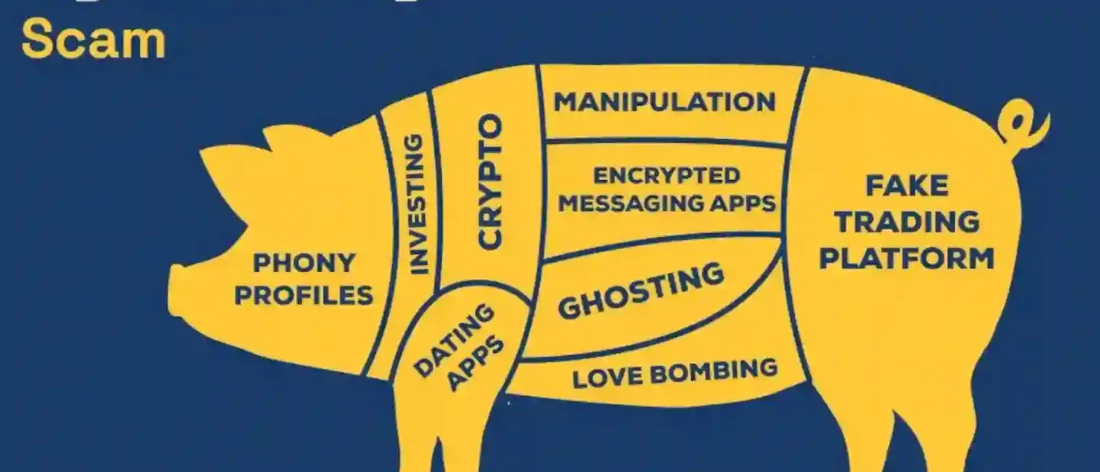If you are a victim of pig butchering, it’s important to report the crime as quickly as possible. This will help law enforcement track, trace, and recover stolen funds.
If you receive unexpected messages on a dating or social media app encouraging you to invest in cryptocurrency, it may be a pig butchering scam. Cryptocurrency scams can be more difficult to prosecute than traditional fraud, because transactions are pseudo-anonymous.
Report the Scam
A pig butchering scam is a type of investment fraud in which fraudsters gain victims’ trust (the pig), “fatten them up” with cryptocurrency investments, and then steal the victims’ funds or crypto in one final swipe (“the butchering”). This scheme originated in China but has now spread globally. Crime syndicates use it to swindle millions of dollars from investors.
These scams usually start with a cold contact reaching out to you out of the blue on social media or a dating app, claiming a mishap like a typo in your phone number. Once you establish a rapport, they will start talking about investments.
These conversations tend to escalate quickly, with the fraudsters pressing you to liquidate your 401K and even mortgage your home. It’s important to report the scam to RSB, as we can work with law enforcement agencies to help you recover your stolen crypto. However, recovery success depends on a variety of factors, including how much time has passed since the scam took place.
Contact Your Bank
If you have lost money in this scam, contact your bank immediately. They will likely work with law enforcement to try to recover the stolen cryptocurrency. However, recovery isn’t guaranteed.
Pig butchering crypto scams recovery is an investment scheme that exploits victims’ emotions and financial vulnerabilities. The scammers often use social media and dating apps to build rapport with their marks, then convince them to invest large sums of money on bogus crypto trading platforms.
They tell their marks that the investments are risk-free, then escalate the pressure to a point where they’re asking their targets to borrow money or liquidate their retirement savings. By the time they realize that they’re being scammed, it’s too late.
Scammers often deny their victims’ withdrawal requests for one reason or another. But if you report the scam to RSB (Report Scam Bitcoin), it can increase your chances of recovering your funds. You can also consult attorneys who specialize in crypto fraud to help you with your recovery efforts.
Contact the Scammer
While there are a number of steps you can take after being victimized, the most important is reporting the scam to your bank and law enforcement. The sooner you report the crime, the easier it will be for your bank to reverse any fraudulent transactions and law enforcement to trace, freeze and seize stolen funds.
Scammers use social media, dating apps and text messaging services like WhatsApp or Tinder to contact potential victims. They often start conversations claiming to have mistyped your number or been contacted by someone else, and then proceed to build rapport.
Pig butchering scams are a complex mix of crypto fraud and romance scams, and they’re often conducted by international criminal syndicates that exploit people in poverty in Southeast Asia for forced labor. ProPublica recently published an in-depth investigation on the issue, based on interviews with victims and former scam sweatshop workers as well as law enforcement officials and rescue workers.
File a Scam Report
In some cases, victims have been able to recover stolen crypto from pig butchering scams by reporting them to the appropriate authorities. However, the process is difficult and time-consuming. It’s also important to remember that crypto is not bank-backed, and if you sent your funds to a fraudulent crypto exchange, it will be nearly impossible to get your money back.
Pig butchering scams often begin as romance or confidence scams, with fraudsters using social media and dating apps to build trust in their targets. Once they have a victim’s confidence, they will start talking about investments and promising substantial returns. Be wary of anyone who starts mentioning cryptocurrency investment early in a conversation.
It’s also a good idea to search third-party reviews and known scams of any exchange, app, or investment platform that you are considering investing with. This will help to prevent you from becoming the next victim of a pig butchering scam. You should also avoid sharing your personal information or financial accounts with anyone you meet online, especially if they are asking you to pay for services upfront in cryptocurrency.





